Presidential primary brief: 498 days until Election Day
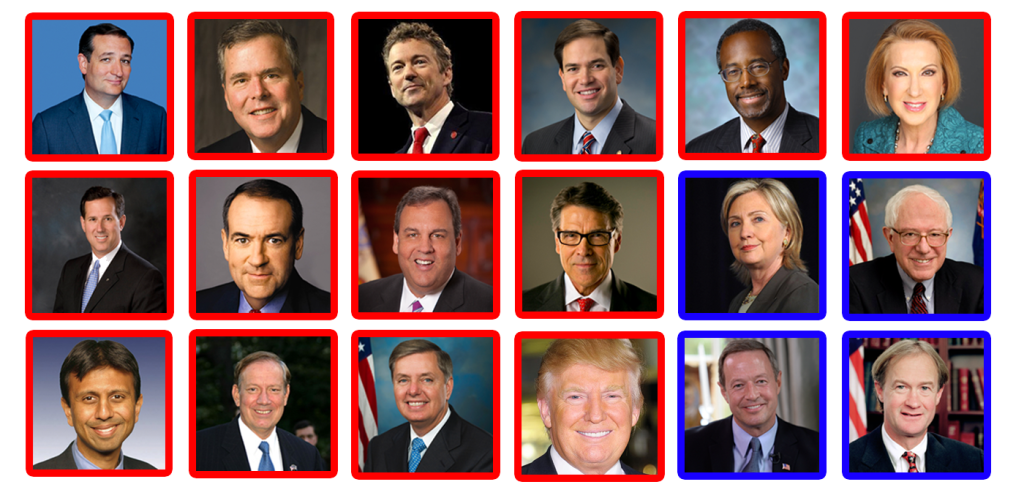
Welcome to the Monday presidential primary brief provided by Alabama Today. Every week you can find your latest headlines on the presidential primary races as we count down the days until Election Day. 245 days until AL Presidential Primary 498 days until Election Day Convention Dates: Republican July 18-21 2016, Democratic July 25-28 2016 Weekly Headlines: Bush leads in N.H. poll, Trump is second WSJ/NBC national poll shows Hillary Clinton crushing all rivals Bobby Jindal announces entry into 2016 presidential race Press Clips: Chris Christie Launches Campaign Website Three Days Before His Announcement (National Journal 6/27/15) If the trips to New Hampshire and leaked announcement invitations weren’t big enough clues, Chris Christie is in for 2016. Like several other campaigns this cycle, Christie’s team went for a digital-first approach ahead of a formal announcement: The New Jersey governor launched a campaign website Saturday, just three days before he’s expected to announce his White House bid from the gym of the Livingston high school where he graduated. He signaled the site’s launch in a series of tweets Saturday morning. New Poll: Bernie Sanders closing in on Hillary Clinton (The Blaze 6/26/15) With the progressive wind at his back, Vermont Sen. Bernie Sanders is emerging as the most viable Democratic challenger, at least in New Hampshire, to former Secretary of State Hillary Clinton for the Democratic presidential nomination. A WMUR/CNN poll released Thursday evening shows Sanders has narrowed the gap between him and Clinton from 21 percentage points to just 8 points in less than two months, for a Clinton lead of 43 percent to 35 percent. The poll was taken from 360 likely Democratic voters from June 18 to June 24. A year ago, Clinton trounced Sanders by 59 percent to 5 percent. 2016 candidates react to Supreme Court’s gay marriage ruling (NBC News 6/26/15) The Supreme Court’s landmark decision that all states must issue marriage licenses to same-sex couples prompted a flood of responses on Friday morning, including from those eyeing the White House in 2016. Reaction from the presidential hopefuls poured in almost immediately after the decision was announced. Democratic presidential frontrunner Hillary Clinton tweeted just moments after the news broke that she’s proud to celebrate the “historic victory.” Here’s what climate hawk Martin O’Malley would do as president (Grist 6/25/15) Say what you will about Martin O’Malley, the former Maryland governor and current Democratic presidential candidate, but the man is a wonk. He may lack for narrative, but he will give you plenty of commonsense solutions. And he has a demonstrated commitment to combating climate change. So perhaps it should come as no surprise that despite his lagging far behind Hillary Clinton and even lefty Sen. Bernie Sanders (I-Vt.) in the polls, he is the first candidate to produce anything resembling a detailed climate policy. It’s only a work in progress, and it isn’t even available yet on the campaign website. But O’Malley’s team shared with Grist a white paper outlining some significant climate change policy proposals. Collectively, they would go further than President Obama has — or than Hillary Clinton has called for thus far. State Dept. gets Libya emails that Hillary Clinton didn’t hand over (NY Times 6/25/15) The State Department said on Thursday that 15 emails sent or received by Hillary Rodham Clinton were missing from records that she has turned over, raising new questions about whether she deleted work-related emails from the private account she used exclusively while in office. The disclosure appeared to open the door for Republicans on Capitol Hill to get more deeply involved in the issue. Senator Lindsey Graham, Republican of South Carolina, who is running for president, said he planned to send a series of questions to the State Department about the missing emails and about why it allowed her to use the personal account. Scott Walker to announce 2016 intentions next month (CBS News 6/25/15) Wisconsin Gov. Scott Walker will make his presidential intentions known the week of July 13, he said on Fox News Thursday night. In a crowded field of more than a dozen Republican candidates, Walker’s standing in the 2016 polls is relatively decent, so far. In a recent Fox poll of likely Republican voters, Walker tied for fourth place. A recent NBC/ Wall Street Journal poll put him in second place. The two-term governor has gained a reputation as a staunch conservative after successfully taking on unions in his state and pushing an often polarizing conservative agenda. Walker told Fox’s Greta Van Susteren that he would bring that same moxie to Washington, should he decide to run. 2016 contenders react to Obamacare ruling (Politico 6/25/15) Here’s how the 2016 presidential contenders reacted on Twitter to the Supreme Court’s decision to uphold a major component of the Obamacare health law: Fox News Poll: Bush, Trump score post-announcement bumps (Fox News 6/24/15) There’s been a lineup change in the race for the GOP nomination, as businessman Donald Trump moves up after declaring his candidacy. He’s now second in the order after former Florida Gov. Jeb Bush, who also got an uptick in support after his formal announcement. For Democrats, former Secretary of State Hillary Clinton is still — by far — the team leader, according to a new Fox News national poll on the 2016 presidential election. After son’s death, Biden not ruling out 2016 bid (CNN 6/22/15) As Vice President Joe Biden slowly returns to official duties in Washington following his son’s death, a decision on mounting a third presidential bid looms in the not-so-distant future. In just more than a month, Biden will determine whether or not to make another go at the top job. And while many Democrats say they’re doubtful he will launch a presidential campaign, his supporters are holding out hope he decides to challenge Hillary Clinton for the Democratic nomination. As he steps back into public life, Biden has set an early August deadline for making his intentions known, said a Democrat familiar with his thinking. Before his son’s death, Biden consistently said he
2016 presidential hopefuls react to SCOTUS Obamacare ruling
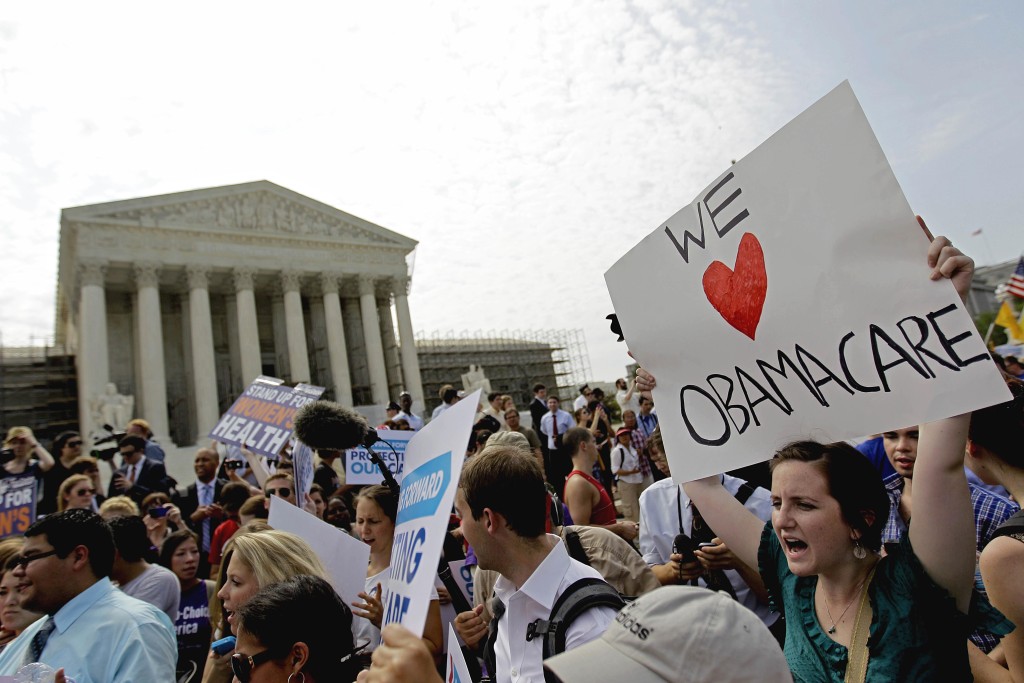
In the wake of Thursday’s Supreme Court ruling in favor of a key part of President Barack Obama‘s signature health care law on Thursday, 2016 presidential hopefuls were quick to weigh in with their opinions of the 6-3 decision. Here’s a compilation of how the candidates reacted to the SCOTUS Obamacare ruling: Former Florida Gov. Jeb Bush: I am disappointed by today’s Supreme Court ruling in the King v. Burwell case. But this decision is not the end of the fight against Obamacare. This fatally flawed law imposes job-killing mandates, causes spending in Washington to skyrocket by $1.7 trillion, raises taxes by $1 trillion and drives up health care costs. Instead of fixing our health care system, it made the problems worse. As president of the United States, I would make fixing our broken health care system one of my top priorities. I will work with Congress to repeal and replace this flawed law with conservative reforms that empower consumers with more choices and control over their health care decisions. Ben Carson: Obamacare fundamentally increases the power of the government over the people and healthcare providers. While I resent what the court has done, it only causes me to work even harder to make sure the next president will repeal and replace Obamacare with sensible consumer empowering solutions that remove the government from the patient/doctor relationship. Those of us who pledge to repeal Obamacare must redouble our efforts and not waste time and energy mourning today’s ruling. Hillary Clinton: I applaud the Supreme Court’s decision to affirm what the authors of the Affordable Care Act clearly intended and wrote into law: that health insurance should be affordable and available in every state across the country. Republicans in Congress have waged a sustained attack against this promise. They’ve voted more than 50 times to repeal or dismantle the law, roll back coverage for millions of Americans, and let insurers write their own rules again – all without proposing any viable alternatives. Now that the Supreme Court has once again re-affirmed the ACA as the law of the land, it’s time for the Republican attacks to end. It’s time to move on. Read more here Sen. Ted Cruz: Today’s decision in King v. Burwell is judicial activism, plain and simple. For the second time in just a few years, a handful of unelected judges has rewritten the text of Obamacare in order to impose this failed law on millions of Americans. The first time, the court ignored federal law and magically transformed a statutory ‘penalty’ into a ‘tax.’ Today, these robed Houdinis transmogrified a ‘federal exchange’ into an exchange ‘established by the state.’ As Justice Scalia rightfully put it, ‘Words no longer have meaning if an exchange that is not established by a state is ‘established by the state.” He also said, ‘We should start calling this law SCOTUSCare’ – I agree. Carly Fiorina: Obamacare has not lived up to what we were promised. Instead of allowing those with insurance to stay on the plans they knew and liked, millions of people have been compelled to buy health plans that they didn’t want. Many have been forced to move to Medicaid and yet more doctors are refusing to take Medicaid patients under this law. We were promised improved access and higher-quality care, but the complexity of ObamaCare is preventing the very competition that would allow more and better options for patients. Instead, hospitals, drug companies, and insurance companies are all consolidating. The lasting solution here is what we’ve been saying all along. We need to repeal ObamaCare. Sen. Lindsey Graham: If you want to repeal and replace Obamacare with something better for your family—bipartisan—vote Republican. Former Gov. Mike Huckabee: Today’s King v. Burwell decision, which protects and expands ObamaCare, is an out-of-control act of judicial tyranny,” Huckabee said in a statement. “Our Founding Fathers didn’t create a ‘do-over’ provision in our Constitution that allows unelected, Supreme Court justices the power to circumvent Congress and rewrite bad laws. The Supreme Court cannot legislate from the bench, ignore the Constitution, and pass a multi-trillion dollar ‘fix’ to ObamaCare simply because Congress misread what the states would actually do. The architects and authors of ObamaCare were intentional in the way they wrote the law. The courts have no constitutional authority to rescue Congress from creating bad law. The solution is for Congress to admit they screwed up, repeal the ‘nightmare of Obamacare’, and let states road-test real health care reforms. Gov. Bobby Jindal: Today, the Supreme Court had its say; soon, the American people will have theirs. President Obama would like this to be the end of the debate on Obamacare, but it isn’t. Now that the Supreme Court has ruled, the debate will grow. Conservatives must be fearless in demanding that our leaders in Washington repeal and replace Obamacare with a plan that will lower health care costs and restore freedom. Former Gov. Martin O’Malley: The Affordable Care Act has helped more than 17 million Americans access quality and affordable health coverage. Now that the Supreme Court has, once again, upheld the Affordable Care Act, we must continue to build and improve upon this hard-won progress. With the national goal of universal coverage now affirmed, we must reduce costs by improving wellness. Innovations for better coordinated care, personalized medicine, and the alignment of profit incentives to promote wellness make all of this possible. Sen. Rand Paul: This decision turns both the rule of law and common sense on its head. Obamacare raises taxes, harms patients and doctors, and is the wrong fix for America’s health care system. As President I would make it my mission to repeal it, and propose real solutions for our healthcare system. As a physician I know Americans need a healthcare system that reconnects patients, families, and doctors, rather than growing government bureaucracy. Former Gov. Rick Perry: The Obama Administration has ignored the text of the Affordable Care Act time and again, and today’s ruling allows them to continue to disregard the letter of the law. While I disagree with
Hillary Clinton looks to build organizational edge in Iowa
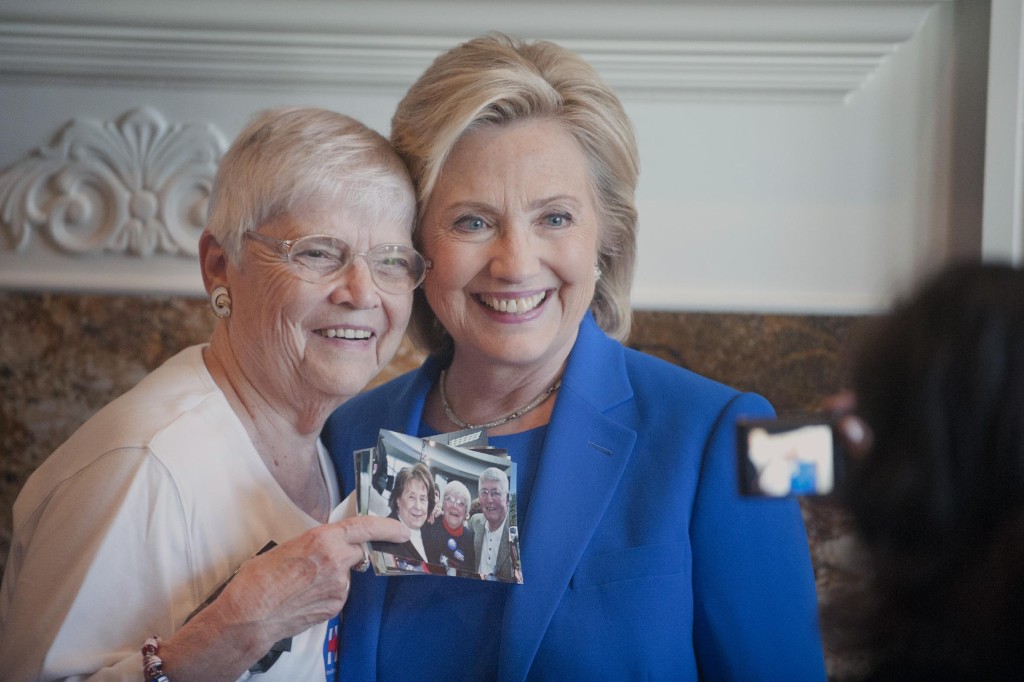
Seeking an army of volunteers, Hillary Rodham Clinton is trying to build an organizational edge in Iowa as some of her lesser-known Democratic rivals clamor for attention in the state that tripped up her first presidential campaign. Clinton flew to Iowa on Saturday night after her high-profile New York kickoff, telling supporters at a Sioux City house party that her campaign would seek to rally the country around an agenda for the future. “Everybody has a role to play,” Clinton said, urging supporters to sign up to join her campaign. Despite her dominant position in the Democratic primaries, Clinton’s allies are trying to erase the memories of her third-place finish in Iowa’s 2008 caucuses, the contest that fueled Barack Obama‘s rise to the White House. The former secretary of state’s Iowa event was streamed online to more than 600 similar gatherings around the country, covering every congressional district in an effort to add volunteers to the campaign’s roster. Clinton planned to address supporters at the Iowa State Fairgrounds in Des Moines on Sunday and then travel to the Mississippi River city of Burlington. But she had company in the state: One of her main Democratic challengers, Vermont Sen. Bernie Sanders, was campaigning across the state during the weekend. Former Virginia Sen. Jim Webb, who is exploring a potential Democratic bid, was holding events in Iowa on Sunday. During her New York speech, Clinton remained silent on some issues of critical importance to the Democratic base, most notably a Pacific Rim trade pact backed by Obama but opposed by organized labor, liberals and others who say it will cost the U.S. jobs. The agreement has not been finalized or submitted to Congress. Sanders, who has opposed the trade deal, again questioned Clinton’s refusal to say where she stood on the Trans-Pacific Partnership. “Most Democrats in the Congress are against it. But I don’t understand how you don’t have a position on this issue,” he said Saturday in Des Moines, where he opened a new campaign office. “You can’t take a position on a trade bill that you can’t see,” Clinton’s campaign manager, Robby Mook, told CBS’ “Face the Nation” on Sunday. Clinton and her advisers are not saying whether she supports legislation in Congress to give the president special negotiation authority on trade deals. In New Hampshire, former Maryland Gov. Martin O’Malley pointed to his executive experience while his campaign noted to supporters in an email that Clinton “didn’t say that she would take any substantive actions to hold Wall Street CEOs accountable for reckless behavior. Nor did she weigh in on the secretive TPP deal that could depress American wages and cost American jobs.” In New York, Clinton offered herself as a fierce advocate for those still struggling from the Great Recession. “I think you know by now that I’ve been called many things by many people,” Clinton said to cheers and laughter from the crowd of roughly 5,500 gathering on New York’s Roosevelt Island in the East River. “Quitter is not one of them.” Hours later in Iowa, Clinton added, “I don’t believe we should ever quit on our country.” Republished with permission of the Associated Press.
2016 hopefuls parade on the Sunday morning shows
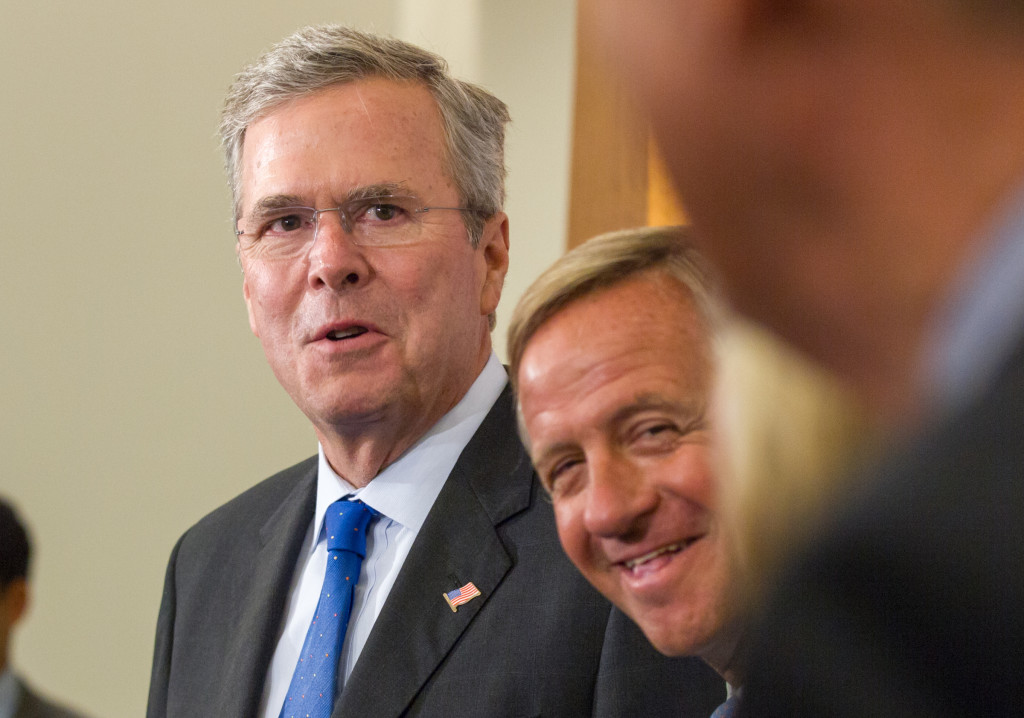
Bernie Sanders is itching to debate and not just with other Democrats running for the party’s presidential nomination. He says Democratic and Republican contenders should be debating each other during the primary season, too. That shakeup is unlikely to happen: Each party is planning its own debates, as usual. But the network news shows Sunday morning were something of a debating society of their own as 10 declared and likely candidates from both parties appeared in a parade of political argument and sound bites, touching on ISIS, personal ambition, immigration, hair color and more. A sampling: Bush on the big question Is some extraterrestrial force keeping Jeb Bush from announcing a presidential candidacy? Pressed on CBS’ Face the Nation, he spoke as if the decision is not his own. “I hope I run,” he said. “I hope, I hope, I’m a candidate in the near future.” What might possibly persuade him not to run? “Who knows?” Bush replied. “I’ve learned not to answer a lot of hypothetical questions.” The former Florida governor said he’ll decide soon after his trip to Europe, which starts in a week. Bush has been campaigning and fundraising for months and the political world would be shocked if he did not enter the Republican nomination race. There are various reasons politicians dance around the question of whether they’re running. One big reason: Once they declare their candidacy, they can no longer work directly with super PACs that are raising money to help them. Bush says he’s already checked with his wife and children they are “totally all in.” That’s if he runs. As he hopes. Why O’Malley? Hillary Rodham Clinton is in the most commanding position by far in the Democratic race. Sanders, a self-described democratic socialist, stepped up in April to take her on and court the party’s left. So what does Martin O’Malley, who entered the contest Saturday, have to offer liberals that Sanders doesn’t? Achievement, he told ABC’s “This Week.” “I have a track record of actually getting things done, not just talking about things,” O’Malley said when asked to compare himself with Sanders, an independent in the Senate who aligns with Democrats. O’Malley served as Maryland governor and Baltimore mayor. Still steamed Presidential candidate Sen. Rand Paul certainly raised hackles in his own party when he blamed the rise of the Islamic State group on Republican hawks, and perhaps none has taken more offense than Louisiana Gov. Bobby Jindal. Jindal was asked Sunday on ABC whether he would support Paul if the Kentucky senator became the Republican nominee. “I don’t think he will be our party’s nominee,” Jindal said. Jindal is expected to say in coming weeks whether he will join the nomination contest. Paul said last week that Republican hawks supported the indiscriminate spread of arms in the region where ISIS operates and some of those weapons have fallen into the hands of extremists. That led Jindal to say Paul is unsuited to be president. The governor says ISIS exists purely because of radical Islam. Bring on the debates “We need a lot more debates in this campaign,” Sanders said on NBC’s Meet the Press. The Vermont senator said the Democratic debates should begin as soon as July and, in a twist, some Republicans should be in the mix. That’s not the plan. The Democratic Party says it will hold six presidential primary debates with its candidates, beginning in the fall. The first Republican debate will be in August, drawn from a much larger field of rivals. Concerning hair Carly Fiorina says she colors her hair, like Clinton does. Fiorina, the former Hewlett-Packard CEO now running for the Republican nomination, told Fox News Sunday she’s just happy to have hair. She lost it for a while when she was battling breast cancer. Clinton told an audience in South Carolina last week that while at age 67 she may not be the youngest candidate in the race, she did have one advantage: “I’ve been coloring my hair for years.” She said most presidents go snow white in office. Republished with permission of The Associated Press.
Democrats’ 2016 field set to grow with Martin O’Malley’s entry
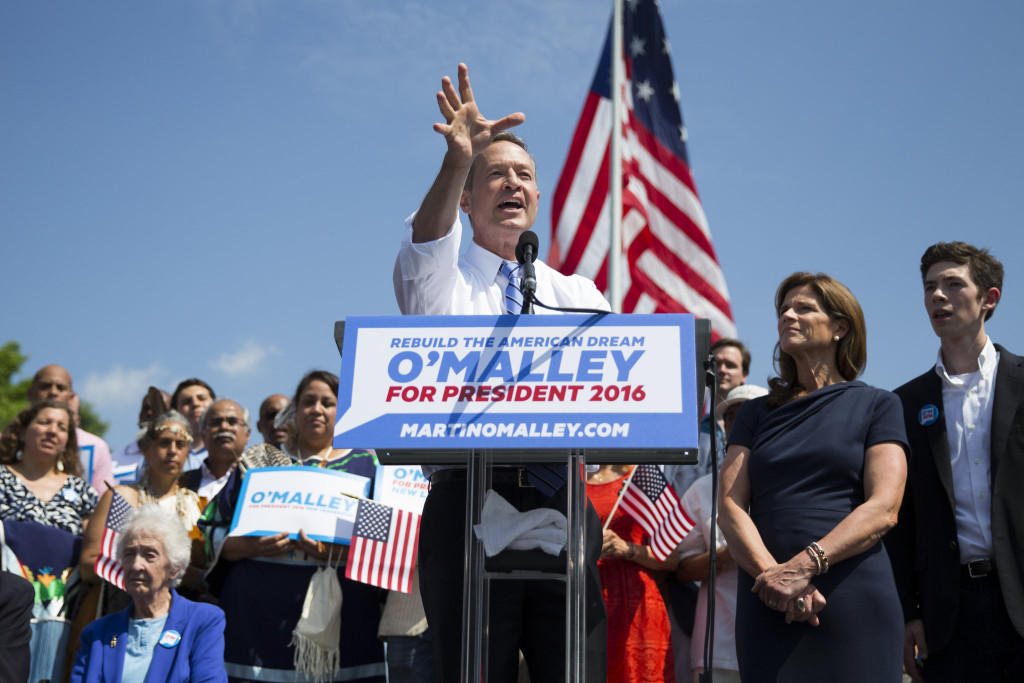
Former Maryland Gov. Martin O’Malley is ready to enter the Democratic presidential campaign with a longshot challenge to Hillary Rodham Clinton for the 2016 nomination. For the site of the official announcement Saturday morning, O’Malley picked a park in Baltimore, where he served as mayor before winning two terms as governor. Aides decorated the front of the stage with signs that read, “O’Malley for President 2016 New Leadership.” Demonstrators were expected nearby to protest against his law enforcement policies as mayor of a city recovering from recent riots. O’Malley met donors Friday night and his advisers released a YouTube video of him strumming “Hail to the Chief” on a guitar. The video shows him nodding his head in agreement, followed by the words, “Stay tuned.” In his spare time, O’Malley fronts an Irish rock band called O’Malley’s March. O’Malley has made frequent visits in recent months to early-voting Iowa, where he was headed after the Baltimore announcement, and New Hampshire. Still, he remains largely unknown in a field dominated by Clinton. Already in the race is Vermont Sen. Bernie Sanders, who could be O’Malley’s main rival for the support of the Democratic left. An ally of former President Bill Clinton, O’Malley was the second governor to endorse Hillary Clinton’s presidential campaign in 2007. But he says Democrats deserve a choice in the 2016 primary. The 52-year-old O’Malley has spoken often about the economic challenges facing the nation and said he would bring new leadership, progressive values and the ability to accomplish things. O’Malley has presented himself to voters as a next-generation leader for the party, pointing to his record as governor on issues such as gay marriage, immigration, economic issues and the death penalty. Just weeks ago, riots in Baltimore broke out following the death of Freddie Gray, an African-American man who died in police custody following his arrest last month. Demonstrators planned to gather near Federal Hill Park during O’Malley’s announcement to protest his criminal justice policies as mayor, an office he held from 1999 until his election as governor in 2006. O’Malley was known for his tough-on-crime, “zero tolerance” policies that led to large numbers of arrests for minor offenses. Critics say it sowed distrust between police and the black community. Supporters note the overall decrease in violent crime during his tenure. O’Malley has defended his work to curb crime, saying he helped address rampant violence and drug abuse. He has said the unrest in Baltimore should wake up the nation to the need to address despair in poor communities. O’Malley could soon be joined in the Democratic field by former Rhode Island Gov. Lincoln Chafee, who plans to make an announcement next week, and former Virginia Sen. Jim Webb, who is exploring a potential campaign. Sanders has raised more than $4 million since opening his campaign in late April and sought to build support among liberals in the party who are disillusioned with Clinton. One of O’Malley’s first tasks as a candidate would be to consolidate support among Democrats who are reluctant to back Clinton and eyeing Sanders. “His first real hurdle here is not Secretary Clinton, it’s Senator Sanders,” said Craig Varoga, who was O’Malley’s chief strategist during his 2010 re-election campaign but is not currently advising him. “There’s no ambiguity at all with Senator Sanders on the issues and he came out of the gate with strong fundraising. He set a pretty high bar.” Republished with permission of The Associated Press.
Problems facing poor inch into 2016 presidential race
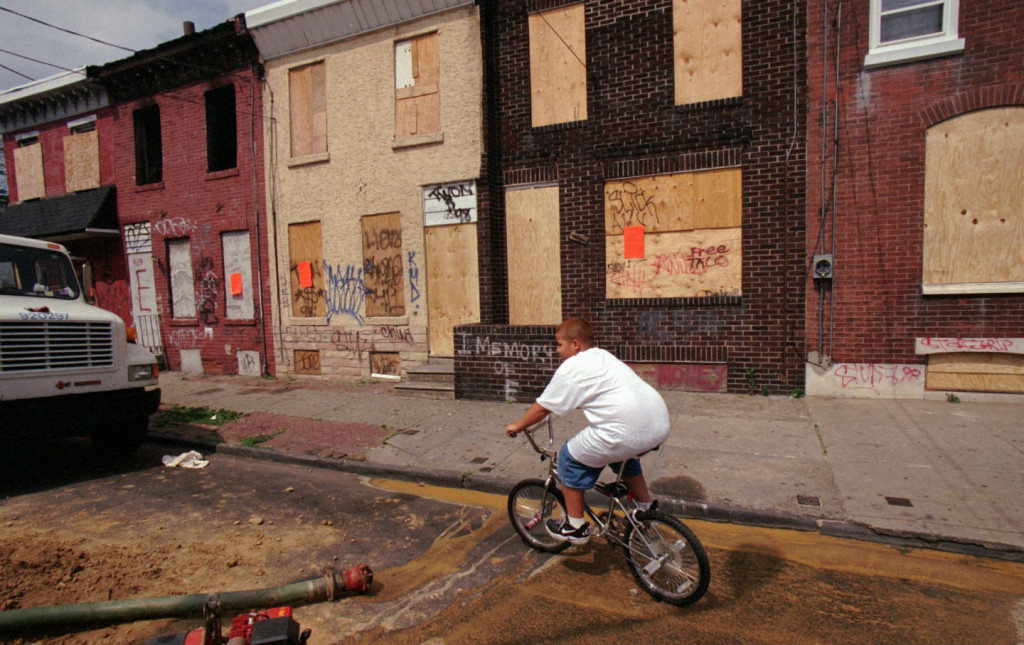
In a presidential campaign where candidates are jockeying to be champions of the middle class and asking wealthy people for money, the problems facing the poor are inching into the debate. Tensions in places such as Baltimore and Ferguson, Mo., have prompted candidates to explore the complicated relationship between poor communities and the police, and the deep-seated issues that have trapped many of the 45 million people who live in poverty in the United States. But addressing the long-running economic, education and security troubles in underprivileged neighborhoods is a challenge with few easily agreed-upon solutions. A frustrated President Barack Obama challenged the nation to do “some soul-searching” after riots in Baltimore followed the death of 25-year-old Freddie Gray in police custody. There have been other deadly altercations between police and black men or boys in Ferguson, New York’s Staten Island, Cleveland and North Charleston, S.C. “I’m under no illusion that out of this Congress we’re going to get massive investments in urban communities,” Obama said. “But if we really want to solve the problem, if our society really wanted to solve the problem, we could.” To some of the Republicans running to replace Obama, his call for spending more money in poor areas underscores the problem with many current anti-poverty programs. The GOP largely opposes new domestic spending and party officials often say federally run programs are bloated and inefficient. “At what point do you have to conclude that the top-down government poverty programs have failed?” said Jeb Bush, the former Florida governor and expected presidential candidate. “I think we need to be engaged in this debate as conservatives and say that there’s a bottom-up approach.” Republicans have struggled in recent years to overcome the perception that the party has little interest in the plight of the poor. Mitt Romney, the GOP presidential nominee in 2012, was criticized for saying he was “not concerned about the very poor” and that it was not his job to worry about the 47 percent of Americans who he said “believe that government has a responsibility to care for them.” More than 60 percent of voters who made less than $30,000 per year backed Obama over Romney in that campaign, according to exit polls. Blacks and Hispanics, who overwhelmingly backed Obama in the past two presidential elections, are most likely to be poor. According to the census, about 27 percent of blacks and 25 percent of Hispanics were poor in 2012, compared with 12.7 percent of whites. Bush has been among the most vocal Republicans discussing the need to lift the poor out of poverty and reduce income inequality, though he has yet to flesh out many of his policy proposals. He has been most specific about the need for greater educational choices and opportunities. Bush frequently cites his work in Florida, where he expanded charter schools, backed voucher programs and promoted high testing standards. Kentucky Republican Sen. Rand Paul has long called for overhauling criminal sentencing procedures that he says disproportionately imprison low-income black men. He has promoted “economic freedom zones” where taxes would be lowered in areas with high long-term unemployment in order to stimulate growth and development. Paul, who has made a point of reaching out to black communities, has drawn criticism for comments he made during the Baltimore unrest. In a radio interview, Paul said he had been on a train that went through the city and was “glad the train didn’t stop.” Sen. Marco Rubio of Florida also has talked frequently about the poor. His anti-poverty proposals include consolidating many federal programs to help the poor into a “flex fund” that states would then manage. Democrats, too, are trying to incorporate plans for tackling poverty into economic campaign messages that otherwise center on the middle class. After the Baltimore turmoil, Hillary Rodham Clinton made a plea for criminal justice changes that could aid urban communities. Among her ideas: equipping every police department with body cameras for officers. She said the unrest was a “symptom, not a cause” of what ails poor communities and she called for a broader discussion of the issues. Former Maryland Gov. Martin O’Malley, who is expected to challenge Clinton for the Democratic nomination, has been at the center of the discussions about Baltimore’s issues. He was mayor from 1999 to 2007 and enacted tough-on-crime policies. While O’Malley is not backing away from those practices, he is trying to put criminal justice issues in a larger context. He wrote in an op-ed that the problem in Baltimore and elsewhere is as much about policing and race as it has about “declining wages and the lack of opportunity in our country today.” In some places that have dealt with recent unrest, residents say they welcome the campaign discussions on poverty and policing, but hope the issues will not fade away when the next big campaign focus arises. “Hopefully these protests are something they’ll wrap themselves around, and we can make sure these issues get addressed,” said Thavy Bullis, a Baltimore college student. Republished with permission of The Associated Press. Photo Credit: Wiki Commons
Vermont Sen. Bernie Sanders to run for president
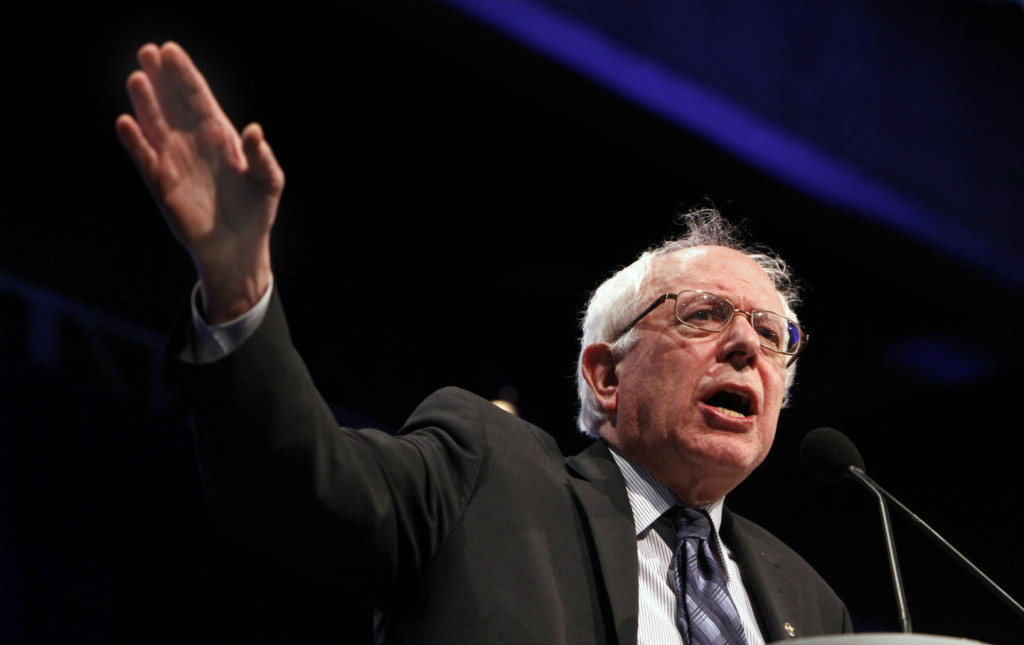
Vermont Sen. Bernie Sanders will announce his plans to seek the Democratic nomination for president on Thursday, presenting a liberal challenge to Hillary Rodham Clinton. Sanders, an independent who describes himself as a “democratic socialist,” will follow a statement with a major campaign kickoff in his home state in several weeks. Two people familiar with his announcement spoke to The Associated Press under condition of anonymity to describe internal planning. Sanders will become the second major Democrat in the race, joining Clinton. He has urged the former secretary of state to speak out strongly about issues related to income inequality and climate change. The former first lady and New York senator is viewed as a heavy favorite in the primary and entered the race this month. The white-haired senator and former mayor of Burlington, Vt., has been a liberal firebrand, blasting the concentration of wealth in America and assailing a “billionaire class” that he says has taken over the nation’s politics. His entry could be embraced by some liberals in the party who have been disenchanted with Clinton and have unsuccessfully urged Massachusetts Sen. Elizabeth Warren to join the race. In recent weeks, Sanders has been a forceful critic of the proposed Trans-Pacific Partnership trade agreement, which would eliminate tariffs and other trade barriers for the U.S., Canada and Asian countries conducting commerce with each other. “One of the key reasons why the middle class in America continues to decline and the gap between the very rich and everyone else is growing wider is because of disastrous trade agreements which have sent millions of decent-paying jobs to China and other low-wage countries,” Sanders said last week. Sanders generated attention in 2010 when he staged a lengthy Senate floor speech opposing a tax agreement by President Barack Obama and Republicans. He has called for universal health care, a massive infrastructure jobs and building program, a more progressive tax structure and reforms to address the U.S. Supreme Court’s Citizens United decision, which Sanders says has unleashed a torrent of money from big donors to political candidates. The senator has generated enthusiasm on college campuses and liberal enclaves in the early voting states of Iowa, New Hampshire and South Carolina and made several trips to court the influential Democratic voters there. “He will add color,” said Lou D’Allesandro, a Democratic state senator from New Hampshire. “He’s not bashful about anything.” Kathy Sullivan, a New Hampshire supporter of Clinton and a member of the Democratic National Committee, said Sanders’ decision was expected. “I know Hillary Clinton has always been expecting for there to be a competitive Democratic primary in New Hampshire,” Sullivan said. “I think he should be taken seriously.” Karl Rhomberg, a Davenport, Iowa, Democratic activist, said that while he expects Clinton “to be the nominee, I expect her to listen to Bernie, listen to (Martin) O’Malley and listen to people from the left.” He added: “If Bernie is going to put a stake on the left side of the field and draw Hillary toward it, that’s OK with me.” Sanders will start his campaign as a distinct underdog against Clinton, who remains the dominant front-runner. The Vermont senator is likely to face other challengers in the primary, such as O’Malley, the former Maryland governor, former Virginia Sen. Jim Webb and ex-Rhode Island Gov. Lincoln Chafee. A feisty voice for liberal policies, Sanders has long championed working-class Americans. He grew up in a Jewish family in Brooklyn — his father, an immigrant from Poland, sold paint for a living —and his views about the distribution of wealth were formed early. “A lack of money in my family was a very significant aspect of my growing up,” Sanders told the AP in December. “Kids in my class would have new jackets, new coats, and I would get hand-me-downs.” After his graduation from the University of Chicago, Sanders moved to Vermont in the 1960s as part of the counterculture, back-to-the-land movement that turned the state from solid Yankee Republican into one of the bluest in the country. Sanders lost several statewide races in the 1970s before he was elected mayor of Burlington in 1981 — a race he won by 10 votes. He was elected to the House a decade later, then won a Senate seat in 2006. He has carried a consistent message during his political career, arguing that the system is rigged in favor of the wealthiest Americans to the disadvantage of the nation’s poor and working class. Associated Press writer Kathleen Ronayne in Concord, N.H., and Catherine Lucey in Des Moines, Iowa, contributed to this report. Republished with permission from The Associated Press.
Marco Rubio tops in GOP presidential pack, best against Hillary Clinton, Q-poll finds
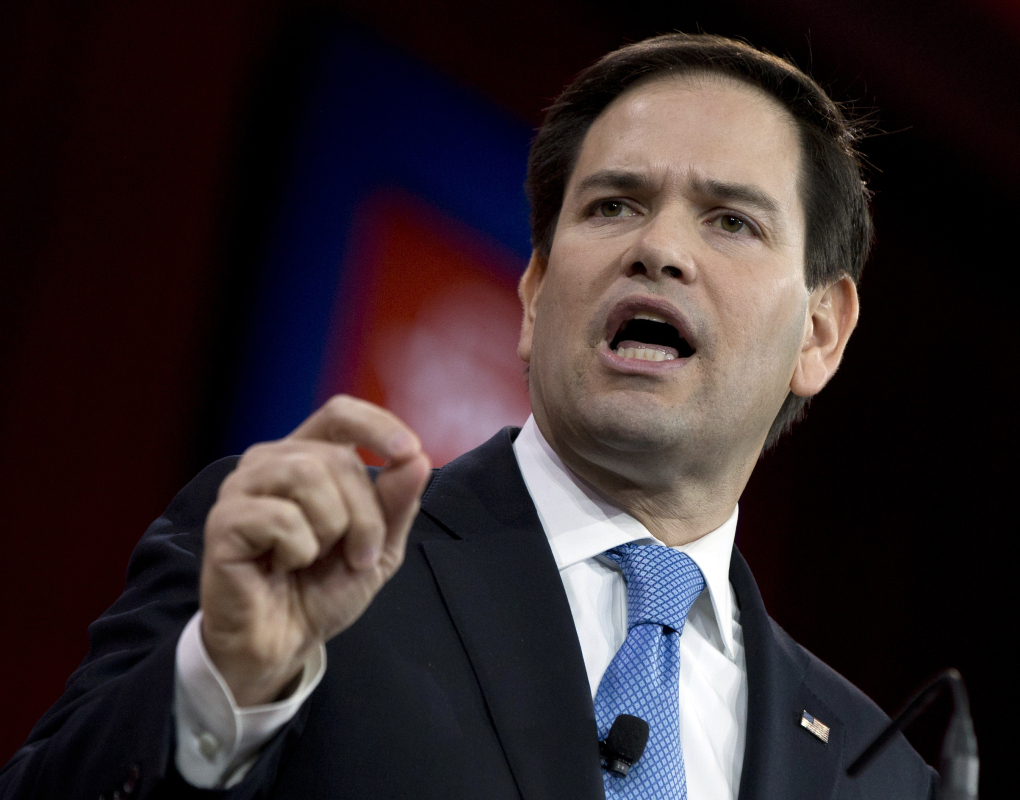
U.S. Sen. Marco Rubio wins the support of 15 percent of Republican primary voters and runs best against Democrat Hillary Clinton, according to a Quinnipiac University National poll released Thursday. The former secretary of state tops the Democratic field with 60 percent and leads top Republican contenders, except Rubio, in head-to-head matchups, the Quinnipiac University Poll finds. The Republican primary field shows Rubio with 15 percent, former Gov. Jeb Bush with 13 percent and Wisconsin Gov. Scott Walker with 11 percent. No other candidate tops 9 percent and 14 percent remain undecided. Bush tops the “no way” list as 17 percent of Republican voters say they would definitely not support him. New Jersey Gov. Chris Christie is next with 16 percent who give him a definite thumbs down, with 10 percent for U.S. Sen. Rand Paul of Kentucky. Clinton owns the Democratic nod with 60 percent, followed by Vice President Joseph Biden with 10 percent and U.S. Sen. Bernie Sanders of Vermont with 8 percent. Former Maryland Gov. Martin O’Malley has 3 percent and 14 percent are undecided. Clinton and Biden each get 7 percent on the “no way” list. “The youngest member of the GOP presidential posse moves to the front of the pack to challenge Hillary Clinton whose position in her own party appears rock solid,” said Tim Malloy, assistant director of the Quinnipiac University Poll. “This is the kind of survey that shoots adrenalin into a campaign. Marco Rubio gets strong enough numbers and favorability ratings to look like a legit threat to Hillary Clinton.” In a general election matchup, Clinton gets 45 percent of American voters to 43 percent for Rubio. She leads other top Republicans: •45-40 percent over Christie; •46-42 percent over Paul; •47-42 percent over former Arkansas Gov. Mike Huckabee; •46-39 percent over Bush; •46-41 percent over Walker; •48-41 percent over U.S. Sen. Ted Cruz of Texas. American voters say 54-38 percent that Clinton is not honest and trustworthy, a lower score than top Republicans. Voters say 62-34 percent that she has strong leadership qualities, besting Republican men by margins of 10 percentage points or higher. Voters are divided 47-47 percent on whether she cares about their needs and problems. Paul cares, voters say 43-35 percent, the best score on this point among Republicans. Voters approve 50-45 percent of the job Clinton did as Secretary of State. They support 53-43 percent a Congressional investigation into her e-mail use, but say 51-44 percent that such an investigation would be politically motivated rather than justified. American voters give Clinton a split 46-47 percent favorability rating. Rubio’s favorability score is 35-25 percent. Other Republicans get negative or divided scores: •29-42 percent for Christie; •33-33 percent for Paul; •33-33 percent of Huckabee; •30-43 percent for Bush; •24-21 percent for Walker, with 54 percent who don’t know enough about him to form an opinion; •25-30 percent for Cruz. “Yes she is a leader, but can she be trusted? Mixed reviews for Hillary Clinton on key character traits,” Malloy said. From April 16-21, Quinnipiac University surveyed 1,353 registered voters nationwide with a margin of error of +/- 2.7 percentage points. Live interviewers call land lines and cell phones. The survey includes 567 Republicans with a margin of error of +/- 4.1 percentage points and 569 Democrats with a margin of error of +/- 4.1 percentage points
A presidential candidate again, Hillary Clinton wants to “champion” everyday Americans
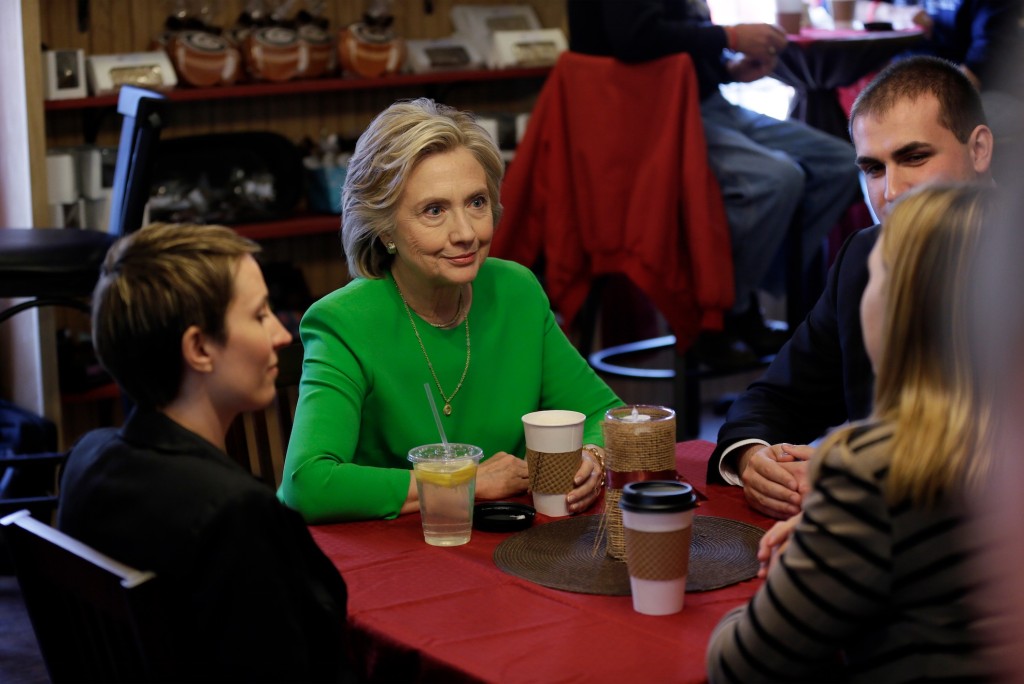
Hillary Rodham Clinton jumped back into presidential politics Sunday, making a much-awaited announcement she will again seek the White House with a promise to be the “champion” of everyday Americans. Clinton opened her bid for the 2016 Democratic nomination by positioning herself as the heir to the diverse coalition of voters who elected her immediate predecessor and former campaign rival, President Barack Obama. She also must appeal to those in her party still leery of her commitment to fighting income inequality. Unlike eight years ago, when she ran as a candidate with a deep résumé in Washington, Clinton and her personal history weren’t the focus of the first message of her campaign. In the online video that heralded her campaign, she made no mention of her time in the Senate and four years as secretary of state, or the prospect she could make history as the nation’s first female president. Instead, the video is collection of voters talking about their lives, their plans and aspirations for the future. Clinton doesn’t appear until the very end. “I’m getting ready to do something, too. I’m running for president,” Clinton said. “Americans have fought their way back from tough economic times, but the deck is still stacked in favor of those at the top. “Every day Americans need a champion, and I want to be that champion, so you can do more than just get by. You can get ahead and stay ahead.” It’s a message that also made an immediate play to win over the support of liberals in her party for whom economic inequality has become a defining issue. They remain skeptical of Clinton’s close ties to Wall Street and the centrist economic policies of the administration of her husband, former President Bill Clinton. Many had hoped Clinton would face a challenge from Massachusetts Sen. Elizabeth Warren, who has said she will not run. “It would do her well electorally to be firmly on the side of average working people who are working harder than ever and still not getting ahead,” said economist Robert Reich, a former labor secretary during the Clinton administration who has known Hillary Clinton for nearly five decades. Unlike some of the Republicans who have entered the race, Clinton was scant on policy specifics on her first day as a candidate. Kentucky Sen. Rand Paul, for example, began his campaign with a website and online videos that described his positions on an array of domestic and foreign policy issues. Clinton also began her campaign for president in 2007 with a video, followed by a splashy rally in Des Moines where she said, “I’m running for president, and I’m in it to win it.” This time around, Clinton will instead head this week to first-to-vote Iowa, looking to connect with voters directly at a community college and small business roundtable in two small towns. “When families are strong, America is strong. So I’m hitting the road to earn your vote. Because it’s your time. And I hope you’ll join me on this journey,” she said in the video. This voter-centric approach was picked with a purpose, her advisers said, to show that Clinton is not taking the nomination for granted. Her campaign said Sunday she would spend the next six to eight weeks in a “ramp-up” period, and she would not hold her first rally and deliver a campaign kickoff speech until May. Clinton is the first high-profile Democrat to get into the race, and she quickly won the endorsement of several leading members of her party, including her home state governor, New York Gov. Andrew Cuomo, and Virginia Sen. Tim Kaine. Still, there are some lesser-known Democrats who are considering challenging her, including former Maryland Gov. Martin O’Malley and Vermont independent Sen. Bernie Sanders. Republished with permission of The Associated Press.


